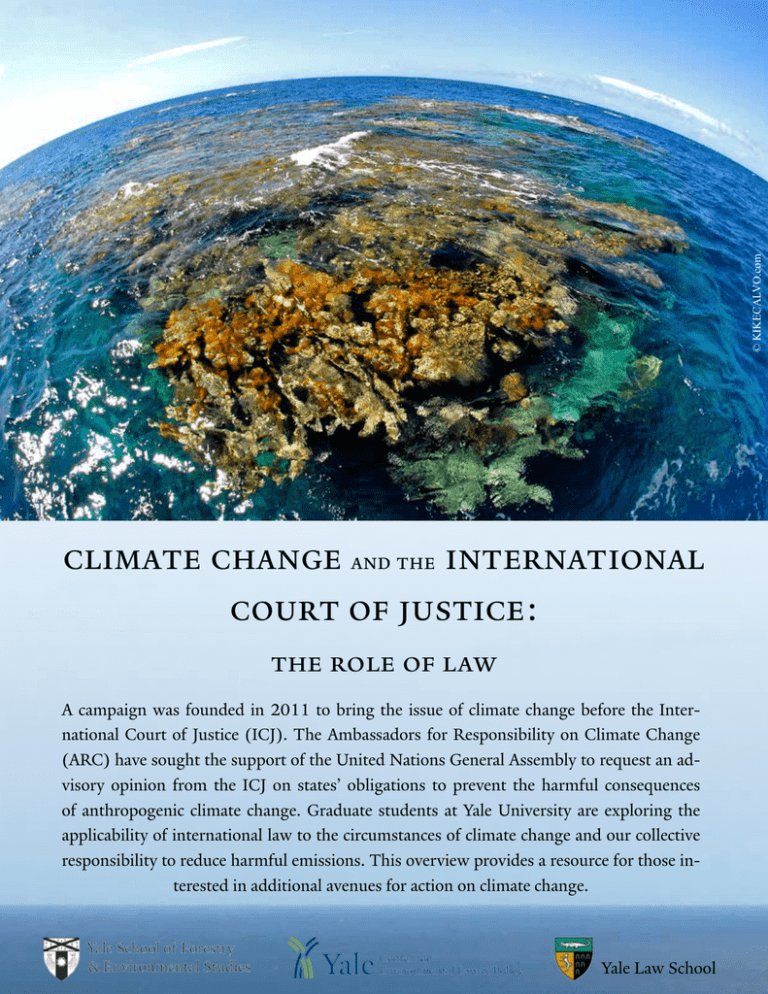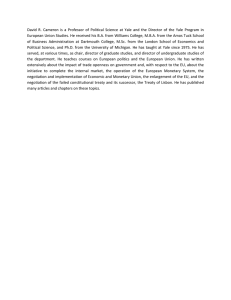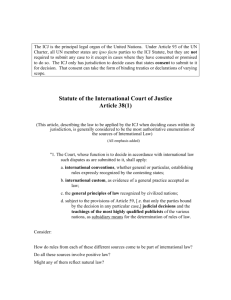Climate Change International court of justice:
advertisement

© KIKECALVO.com Climate Change and the International court of justice: The Role of Law A campaign was founded in 2011 to bring the issue of climate change before the International Court of Justice (ICJ). The Ambassadors for Responsibility on Climate Change (ARC) have sought the support of the United Nations General Assembly to request an advisory opinion from the ICJ on states’ obligations to prevent the harmful consequences of anthropogenic climate change. Graduate students at Yale University are exploring the applicability of international law to the circumstances of climate change and our collective responsibility to reduce harmful emissions. This overview provides a resource for those interested in additional avenues for action on climate change. Yale Law School A NEED FOR ACTION Climate change is a threat to the very existence of some small island states. The twin forces of rising sea levels and increased storm surge intensity will affect both the physical makeup of many nations as well as the people that live on them. Sea-level rise is projected to increase anywhere from 0.2 to 0.5 meters through the year 2100 at a rate of about 4 mm per year, resulting in salt-water intrusion into agricultural land, the destruction of infrastructure, flooding, and coastal erosion. The impacts are already being felt whether on small atoll islands in the Pacific or, perhaps, on an island in New York City. People are being displaced. Voluntary actions by individual States are not enough, says former President Toribiong of Palau, to “stem the rising tides or the flood of global emissions”. The science of climate change is now beyond doubt and the need to take planned action is clear. Graduate students from Yale University became involved in 2012 through the establishment of a course titled Climate Change and the International Court of Justice, jointly offered by Yale’s School of Law and the Yale School of Forestry & Environmental Studies. WHY THE INTERNATIONAL COURT OF JUSTICE? The International Court of Justice (ICJ) is the “principal judicial organ of the United Nations” and, in its advisory capacity, is the proper body to articulate States’ rights and obligations with regard to climate change. The ICJ is specifically mandated to render advisory opinions when so requested by the General Assembly. For the ICJ to give an advisory opinion, it must have jurisdiction to do so, and the question must be admissible. Jurisdiction turns on the authority of the court to hear the case, whereas admissibility concerns the suitability of the question for adjudication. The Court’s jurisdiction to give an advisory opinion if requested to do so by the General Assembly is clear: Article 65(1) of its Statute provides, “The Court may give an advisory opinion on any legal question at the request of whatever body may be authorized by or in accordance with the Charter of the United Nations to make such a request,” while Article 96 of the UN Charter authorizes the General Assembly to request the ICJ to “give an advisory opinion on any legal question.” A question being considered is as follows: What are the obligations and responsibilities under international law of a State for ensuring that activities under its jurisdiction or control that emit greenhouse gases do not cause, or substantially contribute to, damage to another State or States? While jurisdiction appears clear, one might be more doubtful whether so highly political a question should be admissible. But despite some academic opposition, the Court has been firm in a long line of cases, of which the most recent was the Kosovo Advisory Opinion, in holding that, “[T]he fact that a question has political aspects does not suffice to deprive it of its character as a legal question … Whatever the political aspects, the Court cannot refuse to respond to the legal elements of a question which invites it to discharge an essentially judicial task …” It is worth noting that some authors treat the issue of political questions as being jurisdictional rather than one of admissibility; but the effect is the same in either case. Finally, previous cases have shown that the mere fact that there may be ongoing negotiations in the context of a wider treaty framework – in this case the United Nations Framework Convention on Climate Change (UNFCCC) – is irrelevant to whether the Court can or should decide a legal question put to it. The judges serving on the International Court of Justice share a deep knowledge of international law, reflected in their writings and experiences as international advocates, diplomats and representatives. From speeches emphasizing the centrality of the rule of law to legal scholarship analyzing state responsibility for transboundary harms, they already have considered the international law issues at stake in the current campaign. In 2003, for example, Chinese Judge Xue Hanquin published a book titled Transboundary Damage in International Law. Judge Mohamed Bennouna of Morocco previously chaired the G77 group, and has spoken about the G77’s path to sustainability. The former President of ICJ, Japanese Judge Hisashi Owada, recently discussed principles from the Nuclear Weapons case regarding state responsibility to respect other nations’ environment. ON WHAT GROUNDS? A significant body of international legal instruments supports the notion of state responsibility to avoid or control activities that could cause substantial transboundary harm to other nations. Under this diverse body of law, an argument can be made that climate change constitutes transboundary harm, and consequently that states have a positive duty to reduce and/or avoid greenhouse gas emissions in order to limit transboundary harm. The UNFCCC, Kyoto Protocol, and Convention on Long-Range Transboundary Air Pollution provide strong support for this assertion, in particular Article 4.2(a) of the UNFCCC, which commits developed countries to limiting anthropogenic emissions of greenhouse gases. In addition, the “no-harm” principle represents a strong basis for state responsibility under customary international and environmental law, which could be applied to the climate change context. The no-harm principle was affirmed in the famed Trail Smelter arbitration between the United States and Canada and has been restated in various authoritative sources, including the Restatement (Third) of Foreign Relations Law and the ILC Draft Articles on Prevention of Transboundary Harm from Hazardous Activities. A number of declarations and similar instruments—notably the Stockholm Declaration and the Rio Declaration—likewise emphasize the no-harm principle, and call for efforts to address climate change. A basis for climate change-related duties under international law may also be found potentially in fisheries-related international conventions—particularly the Agreement for the Implementation of the Provisions of the U.N. Convention on the Law of the Sea 10 Dec. 1982 Relating to the Conservation and Management of Straddling Fish Stocks and High Migratory Fish Stocks. Finally, a number of human rights treaties and customary law principles represent relevant sources of legal obligation, as greenhouse gas emissions pose serious threats to life, shelter, food, and other core rights. TO WHAT END? An advisory opinion from the ICJ is an appropriate recourse because, in addition to having historic value, it would have the power to positively reshape the international approach to greenhouse gas emissions. For the first time, it would define states’ obligations and responsibilities with respect to emissions under international law. Irrespective of how precisely the ICJ might rule, the overall global discussion on climate change would be advanced by the articulation of clear baseline standards of responsibility. Moreover, the very process of generating debate in the world’s highest court might help to highlight the human toll of climate change, as national representatives would appear in the Hague to highlight the challenges facing their countries. Linking such effects to the lives of ordinary people is critical in order to build the political support for climate policies, which will ultimately strengthen the international negotiation process. References and Further information: Aaron Korman, Giselle Barcia: Rethinking climate change: towards an International Court of Justice Advisory Opinion (2012) David Hunter: The implications of climate change litigation for international environmental law-making (2008) Douglas Kysar: What Climate Change can do about Tort law (2011) Eric Posner: Climate Change and International Human Rights Litigation: A Critical Appraisal (2007) UN News Center: Palau seeks UN World Court opinion on damage caused by greenhouse gases (2011) Rosemary Reed: Rising Seas and Disappearing Islands: Can Island Inhabitants Seek Redress Under the Alien Tort Claims Act? (2002) Shaina Stahl: Unprotected Ground: The Plight of Vanishing Island Nations (2010) Susan Solomon et al: FAQ 5.1: Is Sea Level Rising? Contribution of Working Group I to the Fourth Assessment Report, IPCC (2007) Thomas W. Merrilvl: Golden Rules for Transboundary Pollution (1997) William C.G. Burns: A Voice for the Fish? Climate Change Litigation and Potential Causes of Action for Impacts Under the United Nations Fish Stocks Agreement (2008) Xue Hanqin, Transboundary Damage in International Law (2003) AckNOWLEDGMENTS: Research conducted by Yale Law School and Yale School of Forestry and Environmental Studies graduate students within the framework of the class entitled Climate Change and the International Court of Justice. Edited by Vivienne Caballero and Lia Nicholson, Yale School of Forestry and Environmental Studies Designed by Omar Malik, Yale School of Forestry and Environmental Studies Photography by KIKECALVO.com A special thanks to Douglas Kysar, Deputy Dean and Joseph M. Field ‘55 Professor of Law at Yale Law School contact us: Yale Center for Environmental Law and Policy 195 Prospect St., New Haven, CT 06511 T: 203.432.5967 | F: 203.432.0237 Email: ycelp@yale.edu http://envirocenter.yale.edu/ Yale Law School





